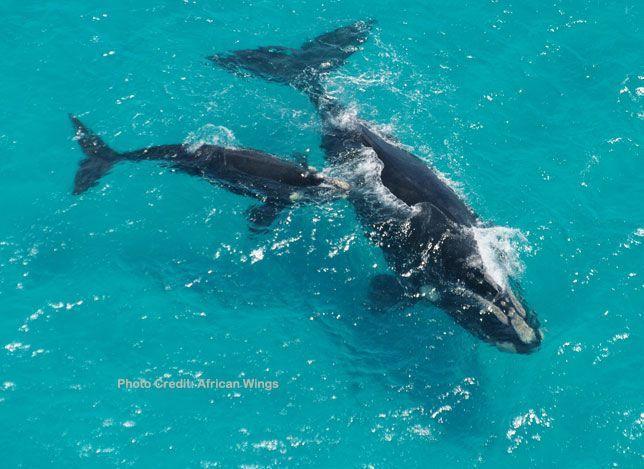Do the whales move away from Hermanus because of Wi Fi?
After many a cup of coffee in a favourite restaurant overlooking Walkerbay we contemplated why we did not see as many whales this year as in previous whale watching seasons. Combining our knowledge of whales and Jeanette’s IT & technical background she formulated a theory worth of opening a discussion. We decided to do an interview with her and want you to join in the conversation at the bottom via comments.

I have a theory. Our whales do not return to Walkerbay because of the distress caused by Wi-Fi signals to the whales and new-born babies.
Southern Right Whales annually visit the Hermanus, Walkerbay area to mate and to calve. They will stay for about six months to nurse their young and then return to the krill enriched Antarctic waters. During this time the baby whales will nurse on their mothers and learn communicating skills through typical whale behaviour; lob tailing, tail slapping, spy hopping and breaching.

Stories told by earlier Hermanus inhabitants tell how migrating whales were slaughtered and turned Walkerbay into a gigantic pool of blood. South Africa banned whaling in our waters in 1979 and since then killing turned to conservation as concerned authorities; fishermen and local citizens slowly turned the tide. Whale numbers have increased steadily and a carefully monitored whale watching industry has created awareness by discover and protecting rather than the exploitation of these harmless Antarctic visitors.

However, the whales are now moving away or worse, not returning at all! In 2009 mother and calve pairs were observed from June up to mid-January. The 2015 whale watching season has ended mid-November with after slow arrivals from July.
Could the culprits be the whale watching boats?
Not a valid argument as the Walkerbay reserve is closed during the whale watching season to ensure minimal disturbance to the whales, therefore it cannot only be the boats. I think we all are guilty.

Look at the development of Hermanus the last 5 years. – no other area had so much development so fast. Less development at De Hoop attract more whales. You can’t stop the development in Hermanus, but maybe extend the parameters of the reserve to protect from shore 1km in Sopiesklip to De Kelders, where more babies are born.

Baleen whales communicate through low-frequency radio waves and if their internal “GPS” gets scrambled they cannot talk to each other. For the past five years, Hermanus has experienced a Wi-Fi explosion! On Par with development, hotspots have sprouted up all along the coastline; from guesthouses to restaurants, from boats to busses. Each time we communicate via mobile phone and internet we send network signals to various service providers and thereby creating an invisible wi fi net above the water. Internet and mobile service providers have erected towers; some of which span signals right across the bay. The output signal strength of some of these towers is 5GHz, double the 2.4GHz mobile phone signals.

Whales are very social creatures that travel in groups called “pods.” They use a variety of noises to communicate and socialize with each other. They also produce some sounds via body displays. Such sounds may be involved with communication. Noises such as forceful spouts may signal aggravation. Slapping pectoral flippers or flukes may indicate arousal, excitement, or aggression. Whales are mammals which mean that they must surface to breathe. Could it be that when surfacing they cannot communicate because of the invisible net of Wi Fi signals?
Just like a parent shouts to be heard in a crowded playground, whales must shout to be heard, above and below ever noisier ocean waters. It's like trying to talk at a party — often a lot of noise will make you either speak louder or, in the worst cases, wait until later to make your point, or not making your point at all.

Whale mums have to talk to their calves all the time. Another possibility is that the calves cannot hear their mothers’ voices. Similar to a human parent, the whales will instinctively move to quieter waters to protect their young. The species’ survival might depend on it.

In May 2009 South Africa had a stranding of 55 pilot whales on a Cape Town beach near Noordhoek. And again in March 2013 nineteen pilot whales were stranded at Kommetjie. Scientists now agree on the fact that sonar plays a significant role in whale standings.

A flotilla of modern sonar navigating fishing vessels, notable at the height of a snoek season up to 50 boats might fish at the entrance of Walkerbay, network and sonar signals could most likely span an invisible barrier preventing the whales to enter the bay as the internal “GPS” system they followed to get here cannot decipher the scrambled signals and they do not turn into the Bay but move on.
Will our high-tech lifestyle soon have similar whale executions? Or will these friendly visitors just fail to turn up?
These are my views on the declining number of Southern Right Whales visiting Hermanus and are only speculations. We would like to hear your viewpoint. Together we might find a solution and keep our whales in the bay.
All the photos were mother and calf behaviour and were taken in the Hermnaus/ Gansbaai whale watching area.
Source
Interview with Jeanette du Toit, owner of Jaydee Media and Hermanus Online Website.
Written by Linda Chivell - Editor & Owner of Marine Wildlife Magazine
Wifi Theory: Jeanette du Toit
Photos courtesy of Marine Wildlife Magazine
Written by Linda Chivell - Editor Marine Wildlife Magazine
Call us and schedule your listing today! Contact Us
Copyright © 2025 Hermanus Online Magazine. Web Development by Jaydee media.

